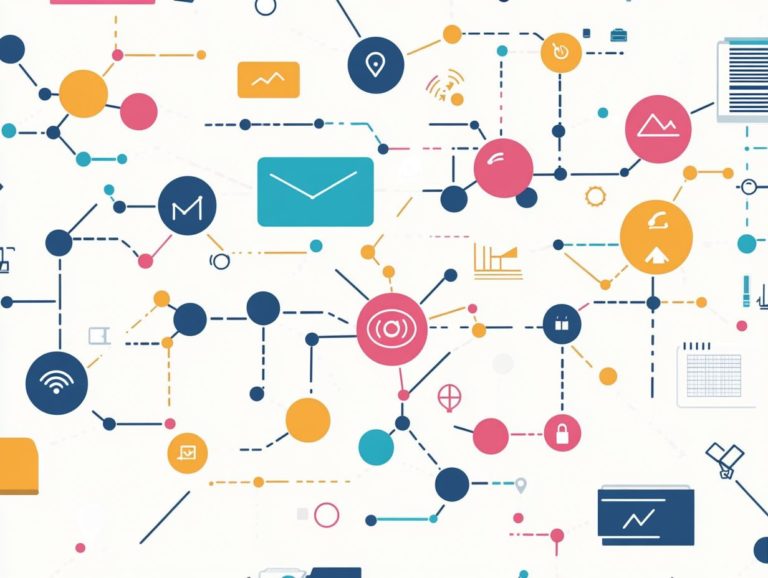how to manage remote project teams?
In today’s digital landscape, remote project teams are essential in many industries. They provide flexibility and access to a global talent pool.
However, managing these teams can present challenges, especially in communication and collaboration.
This article covers the advantages of remote teams, the hurdles you might face, and best practices for overcoming these challenges.
Discover essential tools and tips for building a cohesive and productive remote team!
Let s explore the exciting world of remote project management together!
Contents
- Key Takeaways:
- Benefits of Managing Remote Project Teams
- Challenges of Managing Remote Project Teams
- Best Practices for Managing Remote Project Teams
- Tools for Managing Remote Project Teams
- Project Management Software
- Virtual Meeting Platforms
- Tips for Building and Maintaining a Strong Remote Team
- Frequently Asked Questions
- 1. How can I effectively communicate with my remote project team?
- 2. What strategies can I use to build trust with my remote project team?
- 3. How can I effectively delegate tasks to a remote project team?
- 4. What are some ways to keep my remote project team motivated?
- 5. How can I manage conflicts within a remote project team?
- 6. How can I ensure the success of a remote project team?
Key Takeaways:

Increased flexibility and efficiency are key benefits of managing remote project teams. Communication and collaboration obstacles may arise, but effective strategies and technology can help.
Building trust and teamwork is vital for a strong remote team. Project management software and virtual meeting tools can aid in effective management.
What are Remote Project Teams?
Remote project teams are groups of professionals who collaborate on projects from various locations using digital tools. These tools allow them to bridge gaps of distance.
Teams consist of individuals with diverse expertise and backgrounds, enabling them to tackle various challenges. They use video conferencing, instant messaging, and collaborative software to stay productive.
These teams enhance flexibility, reduce overhead costs, and create a more inclusive workforce by accessing talent worldwide.
Despite their advantages, remote teams face obstacles like miscommunication and cultural differences. Effective leadership and strategic planning are essential for seamless collaboration.
Benefits of Managing Remote Project Teams
Managing remote project teams offers many advantages, including increased productivity and cost savings. You can tap into a diverse talent pool that fosters innovative solutions and boosts engagement.
The flexibility of remote work allows team members to choose their hours, enhancing their work-life balance. This approach cultivates a positive team culture that values diversity.
Increased Flexibility and Efficiency
One standout benefit of remote project management is the remarkable flexibility it provides. You can set your work hours to fit your schedule.
This adaptability improves your satisfaction and productivity, allowing you to focus during your peak hours. This leads to smoother project progress and better resource management.
This autonomy cultivates a sense of ownership, enabling you to take initiative and contribute creatively to project goals.
With the freedom to customize your work environment, you ll feel more engaged and motivated, resulting in higher-quality results.
Remote project management also facilitates collaboration across time zones, ensuring continuous progress and rapid problem-solving. The strategic use of time and resources drives successful project completions!
Challenges of Managing Remote Project Teams
While remote project management has many advantages, it also presents notable challenges. Effective communication, project health, and stakeholder engagement are crucial.
The lack of face-to-face interaction can lead to management hurdles. As a project manager, implementing strong accountability systems is essential to keep teams connected and projects aligned.
Communication and Collaboration Obstacles

Communication and collaboration obstacles are common in remote project teams. These issues arise largely due to factors like time zone differences, the absence of non-verbal cues, and an overreliance on digital collaboration tools.
To navigate these challenges effectively, you should adopt robust communication strategies. Embrace video conferencing platforms and establish clear feedback channels to keep everyone aligned and engaged.
Creating an inclusive environment is essential, where all team members feel empowered to share their thoughts and ideas. Regular check-ins will help you assess progress and address any uncertainties that may arise.
Encouraging asynchronous communication methods allows for greater flexibility in responses, giving individuals the necessary time to thoughtfully formulate their input.
By implementing these strategies, you not only enhance productivity but also strengthen team morale and cohesion. This ensures that remote teams operate harmoniously, regardless of geographical barriers.
Best Practices for Managing Remote Project Teams
To master the details of managing remote projects, embracing best practices is non-negotiable. This entails crafting robust communication strategies and scheduling regular updates through meetings.
Clearly delineating tasks and setting explicit expectations for project completion are essential. By committing to these practices, you can create smoother workflows and foster greater team cohesion, even in a virtual environment.
Effective Communication Strategies
Implementing effective communication strategies is essential for your remote project success. These strategies help mitigate misunderstandings and foster a collaborative environment.
By utilizing various communication channels, such as video conferencing and dedicated feedback channels, you make things clearer and ensure that everyone remains engaged and informed throughout the project lifecycle.
Incorporating tools like project management software can streamline your tasks and centralize updates, allowing you to track progress in real-time. Regularly scheduled check-ins provide a valuable forum for addressing concerns and reinforcing team cohesion.
Encouraging open dialogues through platforms like Slack or Microsoft Teams allows team members to voice their ideas and suggestions, further enriching the project’s dynamics. Adopting asynchronous communication methods, such as recorded video updates, accommodates different time zones and makes participation easier for everyone.
These strategies collectively contribute to a more cohesive team atmosphere, ultimately driving productivity and helping you achieve your project goals.
Utilizing Technology for Project Management
Utilizing technology for project management can significantly elevate the efficiency of your remote team! With a wide range of project management tools and AI-driven solutions at your disposal, you can streamline workflows like never before.
By incorporating digital collaboration tools and project planning software, you can harness predictive analytics a method used to analyze data and forecast future trends to keep a pulse on project health. This helps you make informed, data-driven decisions that pave the way for successful outcomes.
These technologies enable seamless communication among team members, no matter where they are. They cultivate a collaborative environment where real-time feedback thrives.
Features like task automation and time tracking alleviate administrative burdens, empowering your team to dedicate their energy to higher-value tasks. To implement these tools effectively, it s essential for your organization to engage in a thoughtful selection process that aligns the chosen technologies with your specific goals.
Following this, comprehensive training sessions will ensure that all team members feel confident using the platforms. Ultimately, these strategies enhance project visibility and accountability, transforming remote project management into a more organized and streamlined endeavor.
Tools for Managing Remote Project Teams
To effectively manage remote project teams, it is essential for you to utilize the right tools. This means incorporating project management software like Trello and Quire, along with virtual meeting platforms such as Slack and Zoom.
These tools facilitate seamless communication and collaboration among team members, regardless of their geographic locations.
Project Management Software

Project management software is essential for remote project management. It provides key features like task assignments, resource leveling, and real-time progress tracking.
Many of these tools now embrace AI-driven solutions. They predict project outcomes and streamline workflows, allowing your team to manage tasks efficiently, no matter where everyone is located.
In addition to these features, such software often includes collaboration tools like file sharing and communication options. These tools create a cohesive working environment.
For instance, platforms like Trello, Asana, and Monday.com enable you to visually track tasks. They also enhance team interaction through comments and updates.
These features are crucial for keeping your team connected and engaged.
Integrations with other productivity tools enhance your workflow. This makes it easier for your team to meet deadlines and achieve project milestones.
Virtual Meeting Platforms
Virtual meeting platforms are essential for facilitating communication among remote teams. They enable video conferencing and online collaboration in real-time. Tools like Zoom and Slack come equipped with various features that enhance interaction, such as screen sharing and chat functionalities.
These platforms serve as lifelines that bridge geographical gaps. They ensure every team member can participate actively in discussions and share ideas seamlessly.
The ability to easily schedule meetings and record sessions for future reference adds convenience and effectiveness. This gives you the flexibility to manage project timelines with ease.
Many of these platforms also offer integration with project management software. This streamlines your workflows and allows for immediate feedback on tasks.
Leveraging virtual meeting platforms significantly enhances your productivity and collaboration. This makes remote project management not just more effective but also more cohesive.
Tips for Building and Maintaining a Strong Remote Team
Building and maintaining a strong remote team demands a strategic approach that prioritizes team culture, trust, and effective collaboration.
By creating an environment that prioritizes employee satisfaction and engagement, you can quickly build a strong team that thrives even without physical proximity.
Establishing Trust and Teamwork
Establishing trust and fostering teamwork are essential foundations for a successful remote project team. By creating open communication channels and implementing accountability systems, you can significantly improve employee satisfaction.
This motivates team members to collaborate effectively towards shared goals. Consider using platforms like Slack or Microsoft Teams for this purpose.
These tools allow for smooth interactions and foster an environment where people feel valued and heard. Regular virtual check-ins not only help track progress but also build personal connections among team members.
For example, incorporating icebreaker sessions at the start of team meetings can break down barriers. This allows participants to share a bit about themselves and cultivate camaraderie.
Publicly recognizing individual contributions builds trust and reinforces a culture of appreciation. This leads to improved collaboration on projects.
Frequently Asked Questions
1. How can I effectively communicate with my remote project team?

To effectively communicate with your remote project team, it is important to establish clear and consistent methods of communication. This can include regular team meetings, individual check-ins, and utilizing task management tools and remote team dynamics such as video conferencing, email, and project management software.
Be transparent and open with your team. Ensure that all team members are on the same page regarding project goals and expectations.
Want more tips? Check our resources!
2. What strategies can I use to build trust with my remote project team?
Building trust with a remote team is challenging but essential for project success. Encourage open communication, give regular feedback, and allow team members to own their tasks.
Organize team-building activities and virtual social events. These foster camaraderie and trust among members.
3. How can I effectively delegate tasks to a remote project team?
Effective delegation requires clear communication and planning. Define roles for each team member and set realistic deadlines.
Use project management tools to assign tasks and track progress. Regular check-ins help offer support and address any issues.
4. What are some ways to keep my remote project team motivated?
Motivating a remote team can be tougher than with in-person teams, but it s definitely achievable. Set clear goals and recognize achievements along the way.
Offer regular feedback and create opportunities for professional growth to keep your team engaged.
5. How can I manage conflicts within a remote project team?
Conflicts are inevitable. Address them promptly and encourage team members to share their views. Consider using a neutral mediator if needed.
Establish a culture of respect and understanding to help prevent conflicts in the future.
6. How can I ensure the success of a remote project team?
For success, establish clear communication, trust, and a positive vibe. Regularly check in and provide resources to help your team excel.
Celebrate milestones and continuously improve team processes to drive success.






